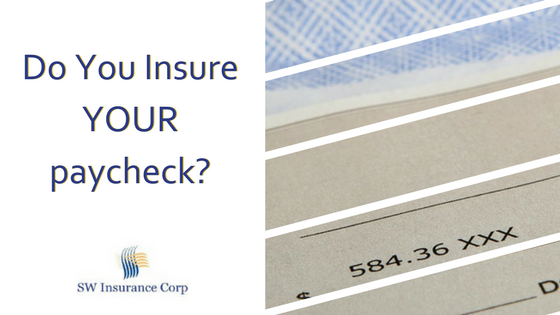How long could you afford to be without YOUR paycheck?
The average American insures their home, their automobiles, and their lives, but they miss one very critical area, their paycheck! Most American workers are without private disability income insurance.
Ask yourself this…
Who would pay your bills if you couldn’t work?
90% of wage earners rated their “ability to earn an income” as valuable. More valuable than retirement savings, medical insurance, and personal possessions.
Medical problems contributed to 63% of all personal bankruptcies filed in the U.S. in 2007. Medical problems contributed to half of all home foreclosure filings in 2006.
If you are injured on the job, you may qualify for Worker’s Compensation, which could help pay some of your bills. If you are unable to go to work because of an injury or illness you may be able to collect Unemployment Benefits. However, keep in mind that 95% of accidents or sickness are not work related, meaning Workers Compensation doesn’t cover them.
Unemployment benefits will only be available if you’re released from your job through no fault of your own. Each state has their own additional criteria, but one of huge importance is that you must be actively looking for a new job.
All options take time, in some cases, a long time. You may be physically or mentally unable to complete the documents needed to collect.
Most people think they will just apply for SSDI (Social Security Disability Income), but you better do your homework. 65% of SSDI claim applications are denied. Can your family live on $1130 a month? That’s was the average monthly benefit in 2012.
Current statistics state that 1 out of 4 workers will be disabled for a short time before they reach the age of 65. Usually because of an injury, illness, or surgery recovery time or even maternity.
Following is an example: A typical male, age 35, 5’10”, 170 pounds, non-smoker, who works an office job, with some outdoor physical responsibilities, and who leads a healthy lifestyle has the following risks:
- 21% chance of becoming disabled for 3 months or longer during his working career
- 38% chance that the disability would last 5 years or longer
- Average disability for someone like him last about 82 months
- If this same individual used tobacco and weighed 210 pounds, the risk would increase to a 45% chance of becoming disabled for 3 months or longer
Excess body weight, tobacco use, high risk activities or behaviors, chronic conditions such as diabetes, high blood pressure, back pain, anxiety or depression, frequent alcohol consumption or substance abuse all INCREASE the risk of disability.
To DECREASE the factors for a disability risk you should maintain a healthy body weight, remove the issues from the paragraph above and keep stress levels to a minimum.
Disability Insurance is coverage that you need for those challenging moments in your life where your health and recovery should be the highest priority. This type of insurance could be used to cover your living expenses like a mortgage and car payments that continue despite your disability. There are several types of coverage available from Short Term Disability to Long Term Disability.
Short-Term Disability Insurance
Short-term disability insurance pays you a portion of your monthly income for a short period of time when you become disabled. Decisions about how much it pays you, how long until benefits get started, and how long it will continue to be paid, depends on the policy chosen.
Short Term Disability insurance can provide funds for whatever you need to protect. It can provide coverage beginning as soon as Day 2 of an injury or Day 8 of an illness or many other effective start dates. Most short-term plans will pay benefits from 6 weeks to 2 years. Short-term disability usually pays quicker, but check with your broker to explore all your options.
Savings and social security benefits are other options, but most people haven’t saved enough to cover being out of work for six months and social security’s disability evaluation can take an extended amount of time. There are also other factors in social security, such as the length of time you’ll be disabled (at least 12 months) before you can qualify.
Long-Term Disability Insurance
Long-term disability insurance can take up where the short-term disability policy ended. For example, if you suffered an injury that makes you unable to work your normal, full-time job, a short-term policy could begin to pay you income by day 2 and continue for 6 months (if that is what you chose). At the end of that 6 month your long-term disability policy could begin.
Consider the fact that only 9 percent of long-term disabilities result from serious accidents. Through illness or injury, becoming temporarily, and in some cases, totally disabled can make a bad situation even worse.
Long-term disability insurance can continue to help cover those bills that you used the short-term policy for. Many people carry long-term disability only. They have enough in savings or 401k plan to cover their living expenses for 60 days to 6 months. With long-term disability plans the longer your wait period is (days on disability before this coverage begins) the lower the premium.
If you want to know more, we can help! We can give you a no obligation disability quote. Contacting us has never been easier, and our office will be happy to let you know all of the options available to meet your needs.
Call us at 720-344-1105 or email us at Sally@SWInsuranceCorp.com.


Recent Comments